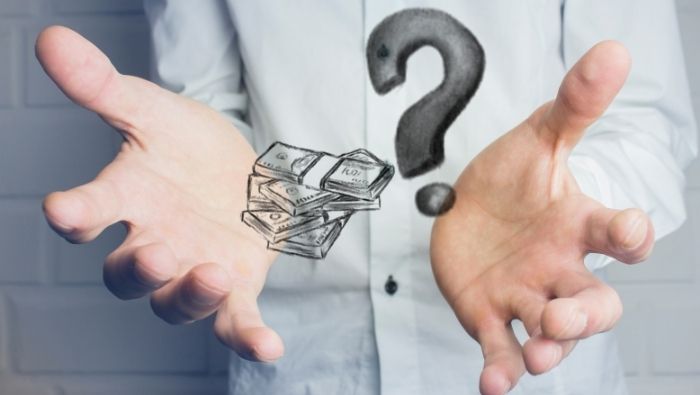Build Emergency Fund or Repay Debt First?
by Gary Foreman

You have credit card debt but you also know the importance of building an emergency fund. In fact, an emergency fund could have helped prevent that debt you’re now carrying, So, where should you put the money you have now? Debt or emergency fund?
Dollar Stretcher,
Right now, I owe $3,100 on my credit card. I have $6,000 in my savings, but I am trying to hit a benchmark of $10,000 in my savings. The way I’ve been saving, I should hit the $10k mark in three months.
However, the balance on my credit is glaring. My total credit limit is $4,500. Should I pay this debt immediately, slowly, or continue to pay a small amount, just over the minimum, until I hit my benchmark of $10k in my savings?
W
Congratulations on your savings success. I’m sure that it feels good to be so near to your goal. Your question is a good one and one that many people ask. Does it make sense to put money in a savings account while you still are repaying debts?
Let’s look at the question in a couple of different ways. First, we’ll discuss why we want/need a savings account and why we borrow money. Second, we’ll look at the purely mathematical aspects of your question. Then, finally, we’ll consider some of the emotional/psychological issues your question surfaces.
Why We Save and Why We Borrow
I’m guessing, but I suspect that you started saving because you became tired of having unexpected expenses that could only be paid using your credit card. And, to tell the truth, those bills aren’t really unexpected. We know that a car or the fridge will break down or we’ll need to visit the doctor. What we don’t know is when it will happen. (See also: How to Know When to Use Your Emergency Fund.)
As to why we use credit cards, the story is usually the same. In the beginning, it’s just convenience. They’re easier to use than cash. Plus they’re handy for the unexpected bill that we can’t handle out of savings. Typically, we want to spread the bill over the next few months and pay down the credit card account.
Sometimes, we find that difficult to do. And today’s unexpected expense gets added to the one from six months ago that we are still working on repaying, so our balance doesn’t disappear but rather seems to be growing. That sounds like what you’re experiencing. (See also: Why We Spend More Using Credit Cards.)
A Look at the Math
Next, let’s examine the math of the question. If you’re asking about the quickest way to both save $10k and repay your debt, your answer will lie in the interest rates. Compare the interest rate being earned on your savings to the interest rate being charged on the credit card. You should put any extra money you have on whichever is higher.
It’s almost certain the credit card bill should be paid off first. Your interest rate on the unpaid balance is probably in the teens. Your savings account is probably in the low single-digit range. Once you’ve paid off the credit card, you can resume adding to the savings account.
If your only concern is how quickly you can accomplish both, you’d actually be wise to pull $3,100 from savings to pay off the credit card balance totally, but some would argue against that. This leads us to the final way to look at your question.
Two Arguments for Ignoring the Math
Are there any emotional issues that would suggest that you should save the money before repaying the debt?
There are some people who, for various reasons, must have some savings available to them. Without it, they feel vulnerable. For them, it would be best to build their savings up to an acceptable level and then use extra money to repay debts. It won’t be the quickest way, but it will help prevent sleepless nights!
Another circumstance that might warrant leaving your money in savings rather than using it to pay off a credit card is if you’re facing a potential loss of income, such as a layoff. If you lose your job, you’ll need that cash from savings to help you make ends meet while out of work. So consider your job security before paying off that credit card.
Related: Ending the Fear of Poverty
What Should You Do?
Only you can decide how comfortable you’d be if your savings were suddenly cut in half, but you might feel relieved knowing that the credit card debt was wiped out. In either case, you should reach both goals in about six months at the rate you’re going. So you won’t have too long to wait. Congrats!
Reviewed January 2024
About the Author
Gary Foreman is the founder and former editor of The Dollar Stretcher. He has been featured in MSN Money, Yahoo Finance, Fox Business, The Nightly Business Report, US News Money, Credit.com and CreditCards.com.
Sign Up for Savings
Subscribe to get money-saving content by email that can help you stretch your dollars further.
Twice each week, you'll receive articles and tips that can help you free up and keep more of your hard-earned money, even on the tightest of budgets.
We respect your privacy. Unsubscribe at any time.
Popular Articles
On After50Finances.com
- 9 Things You Need to Do Before You Retire
- You Didn’t Save Enough for Retirement and You’re 55+
- When Empty Nesters Reorganize and Declutter Their Home
- Reinventing Your Career in Your 50s or 60s
- What Mature Homeowners Should Know about Reverse Mortgages
- 2 Reasons to Collect Social Security Benefits As Soon As Possible


